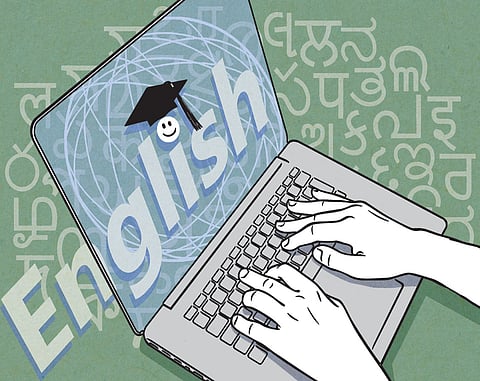Stop prioritising the use of regional language in education
The All India Council for Technical Education (AICTE) in 2021 sanctioned Engineering courses in regional languages including Hindi. This was in alignment with the National Education Policy (NEP) 2020’s vision to nurture local languages.
As it happens with many Tughlaq model reforms, that start with good intentions and end up as a farce, this too has come a cropper. There are hardly any takers for Engineering courses in regional languages. As such the popularity for Engineering degrees are fading, with even IIT graduates finding it hard to get good placements or reasonable salary.
How many parents will risk the future of their wards by making them study Electronics Engineering in Malayalam, Tamil or Hindi? In a country where even the remotest villages are bustling with English medium schools and spoken English courses, only political and ideological compulsion would have led to such reforms.
Whether the language chauvinists of any hue, from the North to the South, from the West to the East, like it or not, English is the language of science and technology in this era. For a country with a billion youths, bursting with aspiration, it is a dampener to be insulated out of this world just to satisfy the ego of a few language bigots.
The irony is that the children of most of these netas get the choicest education from across the globe. It is only the poor and the middle class that have to take the burden of protecting a language. Like anything in the world, whether it is religion, language, culture or fashion, popularity is based on its utility value. All the above, including languages, wax and wane, rise, thrive and die, following its natural course.
In India, where English is not just a language but a ladder to socio-economic mobility, students are acutely aware of its significance in the global job market. They perceive English as the key to unlocking opportunities both domestically and internationally. Engineering students, in particular, are looking toward careers that often transcend geographical and linguistic boundaries. Hence, their preference for an English-medium education is not merely a matter of choice, but one of necessity.
While proponents of regional language courses, including a regional language like Hindi, argue for the comfort and inclusivity such education could offer, the students’ perspectives reveal a different priority. The youth, future engineers, who are poised to innovate and shape the technological landscape, seem to cast their votes resoundingly in favour of English—the lingua franca of the global industry.
The importance of English extends beyond mere communication; it is deeply entrenched as the language of innovation and discovery. Scientific journals, the repositories of cutting-edge research, predominantly publish their findings in English, irrespective of the origin of the work. It is a testament to the universal acceptance of the language as the medium for disseminating knowledge that even non-English speaking countries invest considerable resources to translate their scientific contributions into English. This ensures their research reaches the widest possible audience, facilitating collaboration, peer review and fostering advancements across the globe.
In this nexus of knowledge exchange, India stands at a distinct advantage due to its English proficiency. The subcontinent’s emergence as a powerhouse in technology and computer software owes much to its familiarity with the English language. It is this proficiency that has allowed Indian minds to effortlessly traverse the vast oceans of global information, contributing to and benefiting from a shared repository of technological intellect.
The insistence by the Union government on promoting Hindi over English is a move fraught with contention in a country embellished with linguistic diversity. Regional politicians smell an opportunity here to whip up regional language pride against Hindi, leading to serious viviparous tendencies that could challenge the integrity of the nation. For nearly two centuries, English has been the unifying language of our country. It is alien to every region of the country and so it is neutral.
There is the aspiration for learning English from all sections of the society. There are a thousand ways to protect our languages, like literature, art, music and movies, and we must, but playing with the future of our next generation is definitely not one of them. Ideally, it is time to end the language medium schools and teach students in English from the primary class itself.
As of now, the rich and affluent go for the English medium and the poor have to make good with the regional language medium schools, creating a huge gap between the haves and have-nots. The regional languages, prevalent in that respective region, should be taught as a subject and nothing more than that.
Anand Neelakantan
Author of Asura, Ajaya series, Vanara and Bahubali trilogy
mail@asura.co.in

